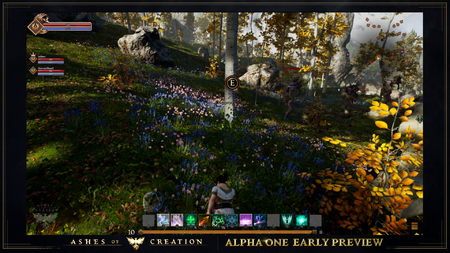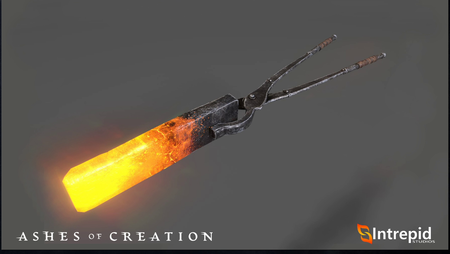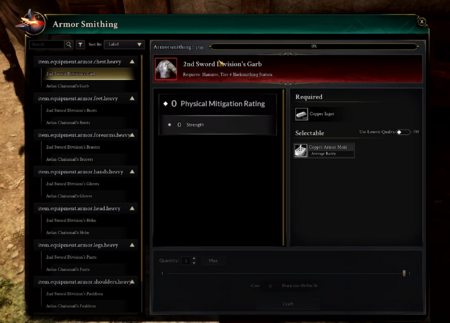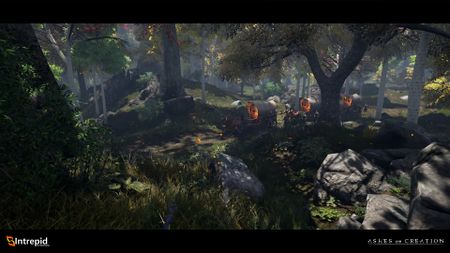Classes artisanales
Les classes d'artisan permettent aux joueurs de se spécialiser dans un ou plusieurs des arbres de compétences suivants skill trees.[1]
L'artisanat et la collecte sont un élément très important de l'économie sur lequel les joueurs auront un contrôle direct. Que vous souhaitiez établir une plantation tentaculaire autour de votre maison, ou parcourir le vaste monde sauvage à la recherche de trésors et de ressources.[2]
Collecte
La collecte est l'une des classes artisanales dans Ashes of Creation.[5][1]
- Les ressources récoltables sont découvertes par essais et erreurs et en apprenant leurs apparences.[5]
- La collecte nécessite la fabrication et l'utilisation d'outils.[6][7]
- Collecter dans la zone d'influence (ZOI) d'un nœud contribuera à son gain d'expérience.[5]
- Certain low level gatherables will have a tiered progression into higher level crafting.[8]
Certain low level gatherables will have a tiered progression into higher level crafting. So for example if I'm gathering... leaves of the blue petal flower to craft a pigment that's going to be used in the development of a tunic that I can wear at level one, then I may need to collect those in order to craft the pigments to craft a greater pigment that might be present in the in the crafting of a higher level item. So it's going to be a tiered progression so that materials have relevancy throughout the different levels of of crafting; and that's important from an economic stability standpoint. You need to have layered demand from a supply standpoint so that players who are interested in collecting and gathering those materials still are relevant when the later level items are crafted.[8] – Steven Sharif
Gathering professions
Gathering tools
La classe artisanale de Collecte nécessite la création et l'utilisation d'outils de récolte qui permettent la collecte des ressources.[6][7]
- La progression dans la classe artisanale de collecte déverrouille des outils de récolte de meilleur niveau, qui permettent de collecter des ressources de plus haut niveau.[10]
- Un collecteur de compétence maximale déverrouillera des outils de maître qui lui permettront d'accéder aux ressources de la plus haute qualité.[11]
- Les outils auront une durabilité et une durée de vie.[11][12]
- Les artisans n'auront pas besoin de s'appuyer sur d'autres arbres afin de fabriquer leurs outils.[6]
Les outils progressent au sein de l'arbre d'artisanat, donc votre aptitude à collecter, traiter ou fabriquer va nécessiter les outils correspondants à cette étape de fabrication afin d'accomplir la tâche en question. Ainsi, vous ne pourrez pas extraire du cuivre et du mithril avec le même outil.[7] – Steven Sharif
Le Traitement requiert des plans pour la construction des bâtiments qui sont nécessaire pour traiter les resources.[6]
Traitement
Traitement is one of the artisan classes in Ashes of Creation.[13]
- Processing involves the refining of raw materials obtained from gathering and item deconstruction.[13]
- Each processing profession has four processing stations that unlock as players progress.[14][15]
- The bulk of the time spent in the artisan system resides in the processing branch. The processing time varies based on the quality of the crafting materials.[16]
- Processing up to journeyman level can be carried out in nodes.[17][18][22][20][21]
- There will be public spaces in nodes where processing artisans can carry out lower-tier animal husbandry and farming activities.[23]
- The intent is that there are also public spaces where animal husbandry and farming can be utilized... Those systems provide opportunities for players who might be more solo-oriented, aren't a part of a family, don't think they'll be able to acquire a freehold, but still want to participate with those particular particular types of professions. But they may not do it at a mastery level as a result; but they'll still have access to lower-tier versions of that so that they can progress through that particular profession up to a degree.[23] – Steven Sharif
Processing professions
Processing stations
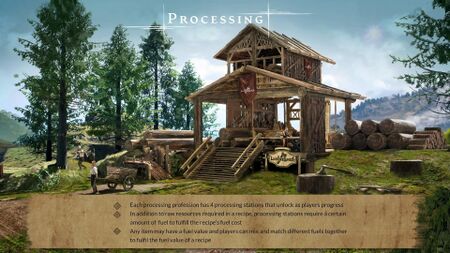
Processing stations are of course a necessary component of taking gatherables into usable crafted goods essentially to fulfill what recipes require in order to make items.[20] – Steven Sharif
We're trying to marry the visuals with what's actually going on with the station. So, if you have a job queued and you're trying to do errands throughout the node, or in your freehold or whatever, [you] should be able to look at the station and know what's going on with it: So you know he's there working and once he's done he's going to stop and you can be like, okay there's stuff ready to pick up and have some visuals associated with that. So, as much as we can have stuff rooted in world instead of throwing a bunch of UI in the player's face, that's something that we're trying to do and is important to us.[25] – Kory Rice
Processing stations are workstations that are used to process raw materials into processed goods (crafting materials) at nodes or on freeholds.[26][27][20][21][16]
- Artisan buildings are required to be placed on freehold (and node) plots to unlock placement of processing stations.[26][15][28]
- Each processing profession has four processing stations that unlock as players progress through their artisan building tech trees.[29][14][15]
- Each processing profession will have four stations; and the stations will come online as you progress through the profession. Each one of those stations will make goods that are immediately useful to the economy, to crafters, to other processors; and each processing station will build on itself and into the other stations.[30] – Kory Rice
- Master and grandmaster processing can only take place on freeholds.[15][19]
- Processing as it stands for Alpha-2's implementation is that there is a certain amount of prep work that's required first for the industry-specific component, which is the building. That prep work might be finding a certain amount of lumber to light the fire in kiln or whatever, to a certain temperature in order for you to process a certain grade of ore; and that grade of ore being malleable then into an ingot; and that produces that ingot so-to-speak. Now, in that process there's a gathering component, there's a preparatory phase, there is a time-related component.[32] – Steven Sharif
- Processing stations have queue slots that allow jobs to be queued at that station.[33] Processing jobs are processed sequentially for all players in freeholds. Processing jobs in nodes are processed sequentially per player, but concurrently with other player's jobs.[34]
- Q: Can you provide more details in regards to the design philosophy behind why it's a queue system for freeholds but not for nodes?
- A: On the freehold, processing can achieve the highest levels of processing. That's where the highest levels of processing occur. Nodes can only go up to a certain level of processing. Now we want to be able to throttle the amount of resources that can be processed at any given time in response to the fluctuation and flows of the economy. So, we want to make sure that the economy is a bigger ship when turning than being able to immediately start processing everything at once and get new resources out as the flow of supply and demand changes within the world. And because- again that's at the highest levels of processing; and you're sharing the available queues that exist at those stations. It's going to take time and it's going to take a long time for the higher level materials.[35] – Steven Sharif
- There will also be time-related and gameplay elements that require the player to interact with processing stations.[33] These elements act to throttle the introduction of processed materials from raw gatherables into the economy.[32]
- There's also possibilities that the machine you're using itself has some type of gameplay layer- should the kiln get overheated, and you have to throw some water on it or something. There are elements there in that process that we want to mimic this gameplay opportunity for players to interact; and not just be a time-sink. But time-sink is also a component of it as well, because that's the throttle for the introduction of processed materials from raw gatherables into the economy.[32] – Steven Sharif
- Processing times, yields, queue times, and job sizes can increase based on node progression, service building upgrades, node policies, and relics.[36][33][16]
- That's going to be very important as you get to very late game processed materials that are required. Because some of these things might have days to process within a station, but if you have spent the time and done the work to advance that processing station you could cut that down considerably, perhaps even greater than 50 percent; and that's going to have a significant impact on your ability to either control markets or to create goods.[16] – Steven Sharif
- Processing stations are distinct from crafting workstations that are used to craft finished goods.[19][27]
- The developers are considering a decay system for processing stations similar to item decay for gear.[37]
- Q: Do processing stations wear out over time? Do they have to be repaired?
- A: That's something that we're still discussing internally. It is coded in such a way where it's an easy variable for us to change that. There are material components that are necessary to feed the machines to keep them up and running, or it could be based on how you interact with the fuel components. If you overheat- overcharge with fuel, that can create like a system degrade similar to your armor decay, which then you have to feed materials in order to rebuild maintenance-wise. Right now it is not implemented. With that in mind, the only maintenance required is going to be through taxation. And depending on the number of permits that you have placed on the freehold will increase the amount of taxes that are necessary to be paid for the freehold.[37] – Steven Sharif
List of processing stations
- Apprentice Crushing Station
- Farms
- Fishery
- Freehold farms
- Metalworking stations
- Mills
- Novice Debarking Station
- Stables
Artisanat
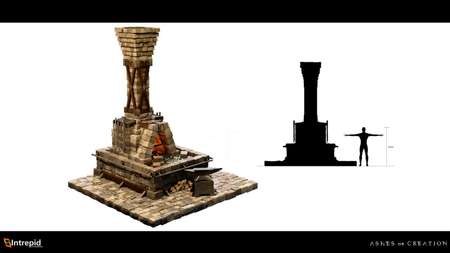
L'Artisanat et la collecte sont des éléments importants de l'économie sur lesquels les joueurs auront un contrôle direct. Que vous souhaitiez bâtir une plantation tentaculaire autour de votre maison ou voyager dans les contrées sauvages à la recherche de trésors ou de ressources. Il y a de nombreux outils disponibles pour les artisans de notre monde. Peu importe comment vous collectez vos ressources, nous croyons que chaque objet qui existe dans le monde doit, d'une certaine manière, refléter son créateur. Ainsi, il y aura une versatilité extrême dans le système d'artisanat - donnant aux artisans la possibilité de créer des objets uniques qui représentent leurs forces et leurs faiblesses.[2]
L'Artisanat est une des classes artisanales dans Ashes of Creation. C'est l'élément moteur de l'économie du jeu.[39]
- L'Artisanat nécessite l'acquisition de recettes pour fabriquer des objets.[6]
- Les postes de fabrication sont situés sur les propriétés privées ou au sein des nœuds.[40][41]
- Les postes de fabrication de niveau supérieur sont déverrouillés avec la progression du noeud.[42]
Tout ce que vous souhaitez créer dans le monde sera construit par les joueurs : que ce soit les navires, engins de siège, armes, armures, etc.[43] – Jeffrey Bard
Il n'y aura pas de système de main d'oeuvre ou d'énergie dans Ashes of Creation.[44]
Il n'y a pas de système de main d'oeuvre ou d'énergie dans Ashes. Cependant, ça ne veut pas dire que l'artisanat ne sera pas difficile. L'artisanat est très difficile ; mais c'est parce que c'est difficile que ça sera également très gratifiant.[44] – Steven Sharif
Crafting professions
- Arcane Engineering
- Armor smithing
- Menuiserie
- Jewel cutting
- Leatherworking
- Scribing
- Tailoring
- Weapon smithing
Recipes
L'Artisanat dans Ashes of Creation repose sur des recettes, pas sur le hasard.[45][46]
- Dans une recette d'artisanat, il y a des cadrans (basés sur les spécialisations d'artisanat) qui sont utilisés pour personnaliser les objets fabriqués, par exemple :[47]
Je pense que Star Wars Galaxies avait un excellent système d'artisanat... La collecte des ressources et le système d'artisanat étaient, je crois, dans leur ensemble, très en avance sur leur temps. C'est dans ce type de direction que nous voulons aller, où il y a des choix à faire dans le système d'artisanat et ces choix changent le résultat que vous obtenez... Ce n'est pas simplement réaliser la recette X pour obtenir l'objet Y. Vous voyez, il y a vraiment de la réflexion présente et il y a un marché à capter sur la base de ces décisions.[49] – Jeffrey Bard
Crafting stations
There's going to be a number of different types of selectables that you can incorporate as part of the crafting process; each of them having unique results as part of the stat block for the weapon, but also increasing the quality, predicated on the quality of the selectable that you're contributing.[51] – Steven Sharif
Crafting stations (also referred to as Crafting benches) are workstations located on freeholds or within nodes.[26][27][20][40][41]
- Recipes have slots for required and selectable crafting materials. Adding higher rarity selectable materials increases the rarity of the crafted item.[53][50][54] Choosing different selectable items can also result in crafted items with different statblocks and unique properties.[51]
- Different tiers of crafting stations represent the quality of the items that can be crafted.[40]
- Higher tier crafting stations are unlocked with node progression.[42]
- Ville (organiser 5) nodes may have one Grandmaster crafting station.[55]
- Métropole (organiser 6) nodes may have two Grandmaster crafting stations.[55]
- Players can only craft up to journeyman level on freeholds.[15]
- Upper-tier crafting benches within a node are accessible by its citizens.[56]
- Top tier crafting stations are present at all node types, however Academic nodes offer additional bonuses to crafting performed there.[57]
- Higher tier crafting stations are unlocked with node progression.[42]
- Crafting stations can pull inventory from a player's personal storage and warehouse storage from the node that the crafting station is in.[58]
- There is no limit to the number of players that can use a crafting station at the same time.[33]
- Crafting stations are distinct from processing stations, which are used to process raw materials into processed goods (crafting materials) at nodes or on freeholds.[27][20][21][16]
- Q: Can crafting stations be mobilized / moved and can they be placed anywhere in the world?
- A: It depends on the crafting station. There are going to be different tiers of crafting stations that represent the quality of item you're looking to create within that specific profession. There's going to be crafting stations that can be utilized by players within their freeholds and then crafting stations that are resigned only to the development of particular nodes, within particular areas, or particular buildings... There's a wide variety of those things to make it a more dynamic experience and something that caveat how players decide to build the world and what the value of those things are.[40] – Steven Sharif
- Légendaire crafting benches are present in the Académie unique building of Métropole (organiser 6) Academic nodes.[59]
List of crafting stations
- Armor smithing stations
- Hideworks
- Laboratories
- Ship workstations
- Smithies
- Stoneworks
- Textile mills
- Weapon smithing stations
- Woodshops
Artisan progression
Les joueurs doivent choisir un chemin dans l'arbre de compétences d'artisan pour chaque personnage.[60] Pour chaque chemin d'artisan (Collecte, Traitement et Artisanat) il y a plusieurs professions. Un personnage ne pourra suivre qu'un seul chemin entièrement.[61][62]
- Les joueurs peuvent s'essayer à chaque profession en tant que "débutants" avant de décider quel chemin ils suivront.[63]
- Choisir un chemin particulier dans l'arbre de compétences donne l'opportunité aux joueurs de se spécialiser dans un certain domaine. Cela crée de l'inter-dépendance entre les joueurs, améliorant l'expérience en tant qu'artisan.[64]
- Il est possible de maîtriser chaque profession du chemin d'artisan choisi, mais cela sera une épreuve longue et laborieuse, coûteuse en ressources.[65]
- La maîtrise n'est pas qu'une question de création d'item. Elle donne accès à beaucoup de choses, même des titres, accès à des items, des négociations, et des quêtes. [68]
- Choisir une profession n'affecte pas les stats des joueurs.[69]
- Les personnages d'un même compte (Alts) pourront avoir différentes professions.[61]
Les joueurs auront l'opportunité de tâter chaque profession à un niveau très bas celà leur donne un avant-goût de chaque profession et leur permet de savoir vers laquelle ils préfèrent s'orienter et quelle profession ils veulent maîtriser.[63] – Steven Sharif
Quand on dit que vous ne pourrez pas tout maîtriser nous ne disons pas que vous ne serez pas maître au sein de votre propre arbre d'artisan, qui sont l'artisanat, la collecte et le traitement. Vous serez un maître d'un des trois, mais vous ne serez pas un maître des deux autres.[62] – Steven Sharif
Artisan mastery
A character may only ever be a Master in up to 3 professions and Grandmaster in up to 2 professions across all artisan branches.[70][71]
- Artisan mastery is no longer restricted to a single branch.[71]
- Characters may change which professions they master.[72]
- Becoming a master Crafter or a master Processor or a master Gatherer should be a significant time investment and resource investment; and because of that it should also be something that when you achieve that status it's like people on the server know who you are.[73] – Steven Sharif
- Masteries aren’t just about making an item. They grant many things, including titles, access to items, bargains, and quests. [68]
- Previously it was stated that with considerable effort a player can master all professions within a mastered parent artisan class.[65][74] This was later changed to a player being able to master some but not all professions within a mastered parent artisan class.[75][60] This was changed to being able to master up to two or three professions within a mastered parent artisan class (subject to testing).[76] This was changed to being able to master up to two professions.[77] The current stance is only being able to become a Master of 3 professions and Grandmaster of 2 professions across all branches.[70][71]
- Q: What would be the daily activities for someone at level 50 with a maxed out artisan tree?
- A: The daily activity might be something along the lines of, depending on what type of profession or processor you are, of interacting with fellow artisanship individuals to wheel and deal on supply and demand chains; orchestrating and participating and caravan roads that move materials across the world so that you can satisfy buy orders and/or commission requests. Participating in unique trades and/or dungeon experiences that have the opportunity to acquire unique crafting materials so that you can create the dragon's legendary sword and sell that potentially. Finding unique harvestable materials in remote parts of the world or engaging in treasure map finding for again unique materials and/or processing things. There's a whole host of different intents that are loops for the players to participate in that again are situationally relevant based on the world state.[78] – Steven Sharif
Artisan gear
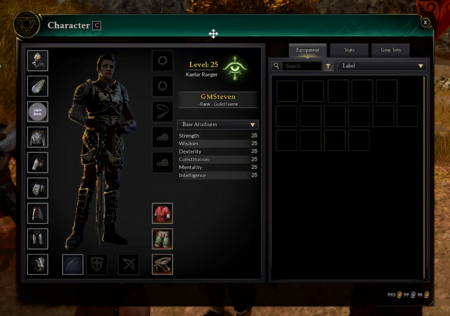
There's gear for all of the different crafting, gathering, and processing professions that'll help you do those different trades.[80] – Kory Rice
Artisan gear boosts artisans in their gathering, processing, or crafting professions.[80][81][82]
- Profession NPCs sell lower level artisan gear.[83] Higher level gear is crafted by players.[81]
- There are three artisan gear slots on a character's paper doll UI.[79] Previously these was referred to as undergarment slots.[81]
- Artisan gear and adventuring gear do not need to be swapped for either to be effective when they are equipped on a character, but players will be able to toggle gear visibility between their adventuring and artisan gear.[84][79][81]
- If you want to be seen as wearing the herbalists outfit, you're still going to have your adventuring gear present and on the character, and benefiting from the stats that are conferred by them; and vice-versa.[84] – Steven Sharif
- Gathering tools and artisan gear have stats that affect gathering rates and yields.[85][86]
- Gear for artisans are going to live alongside your adventuring gear. So you will currently- the approaches, and we'll test this but currently- the approach is you'll have artisanship oriented gear. This might be beneficial for your gathering; it might be beneficial for your processing, or crafting, or whatever it is- your profession. Essentially you will craft that gear, you will equip that gear, it'll live almost as a undergarment slot so to speak; and then you can activate that and it will show the appearance if you wish during the activation when you gain the benefit from the from the gear itself; and then could disappear afterwards and go back to your adventuring gear. That's the current approach. We're going to play with that a little bit. There's some discussion and disagreement on the team about how we do that, but our hopes are for Alpha two, we will have I think a couple of sets at least. We're demonstrating all of the artisanship from gathering to processing to crafting in limited fashion in Alpha 2 want to have that gear present to play with this approach.[81] – Steven Sharif
Work orders
A work order system is planned that will help players find artisans in nodes.[87]
Artisan supply chain
Les artisans dans Ashes of Creation doivent choisir une voie dans leur arbre de compétences d'artisanat. Cette interdépendance crée une chaîne d'approvisionnement allant des matières premières jusqu'au produit fini.[88][48] Chaque étape de la chaîne peut nécessiter des caravanes pour transporter les marchandises d'un artisan à l'autre.[64]
- Obtenir les matières premières :[89]
- En utilisant le métier de Collecte.
- En tuant des monstres et des boss.[90]
- Par la déconstruction d'armes ou d'armures.
- En les achetant à d'autres joueurs.
- Raffiner les matières premières grâce au métier de Traitement.[48]
- Fabriquer le produit fini en utilisant sa recette de fabrication.
En tant qu'artisan, vous allez vouloir savoir où certaines recettes peuvent être complétées ; quels nœuds ont la capacité de créer ce pour quoi vous avez transformé les ressources que vous avez récoltées ; et ensuite, vous allez vouloir planifier votre itinéraire afin d'y acheminer les marchandises ou faire en sorte de vous trouver dans une zone où vous pouvez à la fois collecter et fabriquer. Donc il y aura beaucoup de planification qui sera nécessaire.[92] – Steven Sharif
Timeline
Classes artisanales (Collecte, Traitement, Artisanat) is expected to come online fully in Alpha-2 and the Betas.[93][94]
- Approximately 10 percent of the artisan system was online in Alpha-1.[95][93][94]
- Crafting honestly will not come online in any sense of its true form until Alpha-2. Alpha-1 has essentially what are intended to be the core gameplay loop of crafting, meaning the collection of materials, the translation of those materials into processed goods, and the use of those processed goods into item acquisition. That's the core gameplay loop that is currently present in Alpha-1. But those are mostly facilitated piggy backing the merchant systems right now and not actually using the real crafting system; and that's because crafting hasn't been completed in a form that can be implemented in Alpha-1, but will be for Alpha-2. What's present in Alpha-1 doesn't even really scratch the surface for crafting.[94] – Steven Sharif
Visuels
Voir également
Guides de la communauté
Les références
- ↑ 1.0 1.1

- ↑ 2.0 2.1 About Ashes of Creation.
- ↑
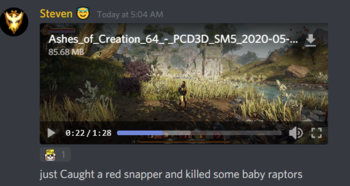
- ↑ Direct, 2020-03-28 (48:31).
- ↑ 5.0 5.1 5.2 Direct, 2017-09-03 (10:48).
- ↑ 6.0 6.1 6.2 6.3 6.4 6.5 Entrevue, 2020-03-27 (9:00).
- ↑ 7.0 7.1 7.2 Entrevue, 2018-05-11 (38:25).
- ↑ 8.0 8.1 Podcast, 2018-05-11 (1:00:07).
- ↑ Direct, 2020-04-30 (54:33).
- ↑ Direct, 2020-04-30 (53:11).
- ↑ 11.0 11.1 11.2 Direct, 2020-07-31 (1:05:58).
- ↑ 12.0 12.1

- ↑ 13.0 13.1 Direct, 2017-05-05 (34:15).
- ↑ 14.0 14.1 Direct, 2023-06-30 (33:26).
- ↑ 15.0 15.1 15.2 15.3 15.4 15.5 15.6 15.7 15.8 Development Update with Freehold Preview.
- ↑ 16.0 16.1 16.2 16.3 16.4 Podcast, 2021-04-11 (40:20).
- ↑ 17.0 17.1 Vidéo, 2023-11-30 (49:24).
- ↑ 18.0 18.1 Vidéo, 2023-11-30 (44:18).
- ↑ 19.0 19.1 19.2 19.3 Vidéo, 2023-06-30 (16:02).
- ↑ 20.0 20.1 20.2 20.3 20.4 20.5 Direct, 2023-04-07 (31:49).
- ↑ 21.0 21.1 21.2 21.3 Direct, 2022-06-30 (1:08:02).
- ↑

- ↑ 23.0 23.1 Entrevue, 2023-07-09 (51:26).
- ↑ Vidéo, 2023-11-30 (46:59).
- ↑ 25.0 25.1 Vidéo, 2023-11-30 (48:22).
- ↑ 26.0 26.1 26.2 Blog: Exploring the Boundless Opportunities of Freeholds.
- ↑ 27.0 27.1 27.2 27.3

- ↑ Vidéo, 2023-06-30 (15:34).
- ↑ Entrevue, 2023-07-09 (33:55).
- ↑ Direct, 2023-06-30 (37:30).
- ↑ 31.0 31.1 Direct, 2023-06-30 (38:18).
- ↑ 32.0 32.1 32.2 32.3 Direct, 2022-02-25 (1:12:27).
- ↑ 33.0 33.1 33.2 33.3 Direct, 2023-11-30 (1:26:16).
- ↑ Vidéo, 2023-11-30 (39:15).
- ↑ Direct, 2023-11-30 (1:28:10).
- ↑ Vidéo, 2023-11-30 (43:43).
- ↑ 37.0 37.1 Entrevue, 2023-07-09 (54:46).
- ↑ Direct, 2018-08-17 (15:14).
- ↑
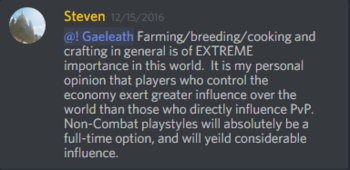
- ↑ 40.0 40.1 40.2 40.3 Direct, 2020-01-30 (1:38:26).
- ↑ 41.0 41.1 Direct, 2017-05-12 (1:00:18).
- ↑ 42.0 42.1 Entrevue, 2020-07-19 (6:38).
- ↑ Direct, 2017-05-24 (17:08).
- ↑ 44.0 44.1 Entrevue, 2018-10-20 (2:31:39).
- ↑ Direct, 2017-05-05 (20:41).
- ↑

- ↑ Direct, 2017-05-26 (5:25).
- ↑ 48.0 48.1 48.2 48.3 Direct, 2017-05-10 (8:22).
- ↑ Direct, 2018-06-04 (35:11).
- ↑ 50.0 50.1 Vidéo, 2023-11-30 (59:21).
- ↑ 51.0 51.1 Vidéo, 2023-11-30 (1:01:04).
- ↑ Vidéo, 2023-08-31 (45:06).
- ↑ Direct, 2023-11-30 (1:38:47).
- ↑ Entrevue, 2018-10-20 (17:31).
- ↑ 55.0 55.1 Direct, 2023-12-19 (1:49:28).
- ↑ Podcast, 2021-09-29 (4:43).
- ↑ Direct, 2023-12-19 (1:50:51).
- ↑ Direct, 2022-07-29 (1:17:33).
- ↑ Blog: Know Your Nodes - Scientific Node Type
- ↑ 60.0 60.1

- ↑ 61.0 61.1 Direct, 2017-05-24 (32:07).
- ↑ 62.0 62.1 Direct, 2019-07-26 (1:09:46).
- ↑ 63.0 63.1 Entrevue, 2020-03-27 (5:25).
- ↑ 64.0 64.1 Direct, 2017-05-10 (6:12).
- ↑ 65.0 65.1

- ↑ 66.0 66.1
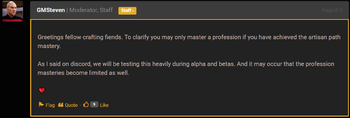
- ↑

- ↑ 68.0 68.1

- ↑ Direct, 2017-07-18 (37:25).
- ↑ 70.0 70.1

- ↑ 71.0 71.1 71.2
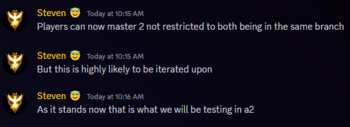
- ↑

- ↑ Entrevue, 2020-07-20 (18:47).
- ↑
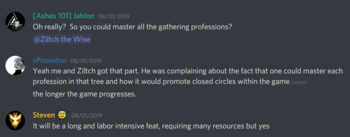
- ↑

- ↑ Direct, 2022-04-29 (1:13:00).
- ↑

- ↑ Entrevue, 2023-07-09 (42:51).
- ↑ 79.0 79.1 79.2 Vidéo, 2023-11-30 (19:06).
- ↑ 80.0 80.1 Vidéo, 2023-11-30 (5:47).
- ↑ 81.0 81.1 81.2 81.3 81.4 81.5 Direct, 2022-06-30 (1:17:34).
- ↑ Direct, 2021-03-26 (1:06:50).
- ↑ Vidéo, 2023-11-30 (12:05).
- ↑ 84.0 84.1 Direct, 2023-11-30 (1:37:49).
- ↑ Vidéo, 2023-06-30 (3:14).
- ↑ Vidéo, 2022-10-28 (26:14).
- ↑ Podcast, 2023-12-03 (16:06).
- ↑ Entrevue, 2020-07-20 (20:17).
- ↑ Direct, 2017-05-08 (20:41).
- ↑ Direct, 2017-07-18 (38:30).
- ↑ Direct, 2017-05-26 (26:00).
- ↑ Entrevue, 2018-05-11 (24:18).
- ↑ 93.0 93.1 Direct, 2021-03-26 (42:28).
- ↑ 94.0 94.1 94.2 Entrevue, 2021-02-07 (35:30).
- ↑ Direct, 2021-04-30 (41:18).
